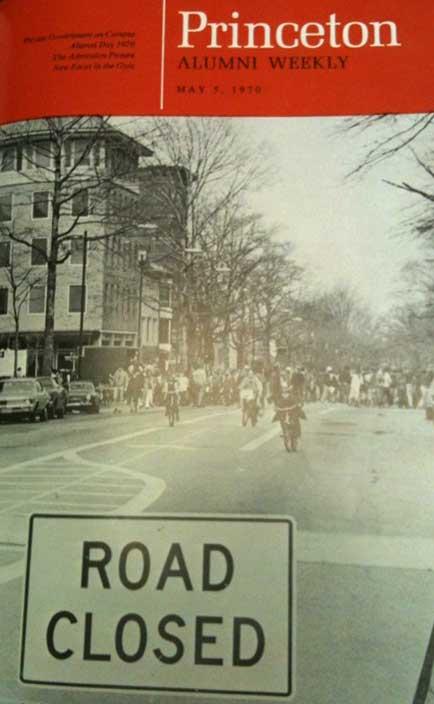
The May 5, 1970, PAW featured an unusual sight on the cover: Nassau Street, closed to traffic "for the first time in memory." Students and townspeople wandered on the road and rode bicycles April 19, kicking off Princeton's first Earth Day celebration. Princetonians will be back on the street Saturday, April 24, for Communiversity, Princeton's annual town-gown festival. Below, PAW's coverage of the Earth Week events in 1970.
From PAW, May 5, 1970
The University: Earth Day
Earth Day, April 22, was only part of Earth Week at Princeton. On Sunday, April 19, students and townspeople gathered in front of Nassau Hall and spread out for litter clean-up marches in various parts of the campus and community. Two hours later, the debris was dumped near the PJ&B railroad station.
There was also a memorial service for the internal combustion engine, a band concert, and exhibition of 100 wooden panels on which Princeton artists depicted aspects of the environmental crisis. For two hours, Nassau Street was closed to traffic while the crowd sang "This Land is Your Land," handed out "polluter" awards, watched tricycle races, and looked at displays of "eco-pornography."
On Earth Day itself, students took off [from] classes and participated in 17 workshops, beginning with a multimedia "Rite of Celebration for the Planet Earth" in the University Chapel. The panels considered such topics as "The Last Frontiers: Wilderness Areas and Resource Conservation," "Energy Production and Consumption: Effluents from the Affluent," "Pollution and the War: The Quality of Life," and "Pesticides, Insecticides, and Herbicides: Better Things for Better Living Through Chemistry!"
The night before, seven speakers, including university trustee Laurance S. Rockefeller ’32, Pan American World Airways president Najeeb Halaby, and Senator Clifford Case (R-NJ) addressed a community meeting on "What Direction for Environmental Policy in the 1970s?" Finally, on Sunday, April 26, the ecologists heard from Ralph Nader ’55 in an address in Alexander Hall.
Petitions endorsing a three-point "action program" for the university were circulated throughout the campus by the student "Ecology Action" group. They called for:
1. The establishment of an interdepartmental environmental studies program, in which everything taught would be addressed to some facet of the environmental problem -- "analyzing it, finding solutions, and enacting solutions." The university, says Ecology Action, "can be a model for informed action rather than simply a source of information."
2. The efforts of an environmental advisory committee, a concept endorsed by the Council of the Princeton University Community, should be directed toward four areas: the functioning of the university itself as it consumes "a vast input" of natural resources; the potential impact, "constructive and/or destructive," of university-sponsored research; use of corporate votes at stockholders' meetings "in an informed, responsible way" after investments are analyzed as to their "support or non-support of environmentally destructive practices"; and attention to the impact individuals can have.
3. The setting aside of a "natural area" on campus with assurance that it will remain unpaved and wooded.
